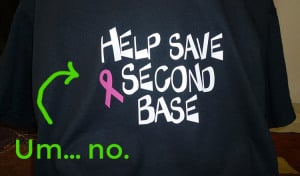
Person looking up at the light.
I remember the day I got fired from my first job so vividly. I woke with a headache; my throat was swollen and I could barely breathe out of my nose. I checked my calendar and remembered my quarterly review was scheduled—I knew that meant I couldn’t call in sick.
When I sat down at my desk, a co-worker handed me her box of tissues “Guess it’s your turn to get sick, huh?” she said. I smiled and took the tissues. I needed them. I opened my laptop and my Google Chat was pinging incessantly. It was someone from the human resources team. She’d asked me to meet her downstairs 30 minutes ago.
I knew this wasn’t good—multiple pings from HR is never a good thing. I walked into the conference room and what I thought would never happen to me did: “Brittany, we’re going to have to let you go.”
The woman from HR continued, discussing severance packages, health insurance and when I’d need to turn in my company phone. I wasn’t listening. I had failed. I was lucky enough to get a job right out of college and I had blown it less than six months later.
The words “you are a failure” played in my head over and over again. I was sure I wouldn’t be able to come back from this. I was in an unfamiliar city with minimal savings, no backup plan and a bruised ego.
When you’re a woman of color, it often feels like the weight of the world is on your shoulders.
Growing up, my parents told me to get good grades, excel at extracurricular activities, volunteer and do so much more. And when I’d mess up, it wasn’t a bad thing, but I certainly wasn’t left to sit with my failure. It was always, “Get back up again! Dust yourself off!”
The day I lost my job I realized that I was raised looking up to some incredible Black women, but I’d never really seen any of them fail. I sorted through memories of their most difficult times to see how they coped so I’d know how to move forward, but nothing registered.
The next few months I was bombarded with images on TV and social media of strong women whose journeys seemed so perfect—with just a dash of inconvenience—which only made me feel worse.
It took me a while to move past the initial shame I felt from being let go from a company I’d wanted to work for so badly. My journey got worse before it got better, but one thing I can say with certainty now is that failure is a normal part of life—how we choose to cope with it is key.
Curious about how failure specifically affects marginalized people, I spoke to Caroline Beaton, a writer who specializes in psychology, and Dr. Joy Harden Bradford, an Atlanta Psychologist and creator of Therapy for Black Girls.
These women shared their advice on how women of color can negate the only strong, never weak tropes that are often fed to us and move on from unexpected failure in a healthy manner.
1. Don’t get so attached to a vision of your future that you refuse to edit it.
Over time, we change. Beaton says that when we fail it can seem catastrophic because “We change the course of our imagination and are forced to let go of what we thought and hoped would happen.” But this doesn’t mean that a goal you’re trying to accomplish won’t happen at all, it just means you may have to adjust your roadmap.
2. Recognize the difference between being persistent and detaching yourself from your failure.
“Sometimes when we fail that’s just a sign to keep trying,” Beaton explains. “I’ve been trying to get published by the New York Times for the last six months and kept getting rejected. I kept pushing, kept trying, and eventually, I broke through with an editor there.”
In other words, there will be goals of ours that we may not be able to achieve until we fail and learn from those mistakes. However, there will also be failures that serve as signs to move on.
Beaton used the example of a relationship that ended in a way that was out of her control. In those situations, Beaton says you have to know to let go when perseverance is no longer serving you in a positive way.
3. Understand that social media is not reality.
When is the last time you saw a friend upload a video of her crying because she got rejected from a job? Chances are, you haven’t.
When you’re feeling down, choosing to browse Instagram can often leave you feeling worse off, especially after seeing one too many announcements about pregnancies, engagements and job offers.
“I encourage everyone to monitor and assess their relationship to social media,” Dr. Bradford suggests. “When you realize that you’re having difficulty distinguishing between the reality of what’s happening versus what’s shared on social media, it’s likely time for a break.”
Bradford also encourages heavy social media users to zero-in on what type of posts get them down the most. Negative feelings towards someone else’s engagement or job promotion may be a place in your life that needs further developing and actually has little to do with a followers social media post.
4. Don’t forget to take care of yourself.
Even in the midst of disappointment, it’s important we’re taking care of our bodies and practicing responsible self-care. Dr. Bradford says it’s okay if we need a little extra help.
“Doing things like setting reminders in your phone to eat can be a good thing. We often forget simple things like eating when we’re struggling,” she says. “Talking to friends and family members who are understanding and supportive is also good to help with feeling less alone.”
In addition to these things, Dr. Bradford suggests physical activity to dopamine pumping, which improves your mood. As a psychologist, she also strongly recommends finding a good therapist to share your concerns with.
5. If your failure has affected others, take responsibility.
A good rule of thumb is to try not to cause harm as we move throughout our time here. But ultimately, we’re human and mistakes do happen. However, when these mistakes affect someone else, Dr. Bradford says it’s important to apologize and see if there’s anything you can do to rectify the situation.
No matter how many strong people we see on television, social media or reflected in our own lives, it’s important to remember that no one has gotten to where they are without a few mistakes.
If you find yourself in the midst of a failure that seems too catastrophic to come back from, take some time to sit with what you’re feeling, reflect, write those feelings down. Then, remind yourself why you started.
Lastly, in the words of Dr. Bradford, “Be gracious with yourself, we’re human and mistakes happen.”
[do_widget id=’text-101′]
Brittany King is an independent journalist located in the Midwest where she covers race, gender and politics for national publications. Formerly, she managed social media for brands like Hershey and Anheuser Busch and covered diversity and inclusion issues for higher ed institutions. Currently, she’s a business reporter for the Indianapolis Recorder and a copy editor for FoodBeforeLove.com.
Search our 3000+ articles!
Read our articles about:
Our online racial justice training
Used by hundreds of universities, non-profits, and businesses.
Click to learn more
Most Read Articles
- « Previous
- 1
- …
- 30
- 31
- 32



















